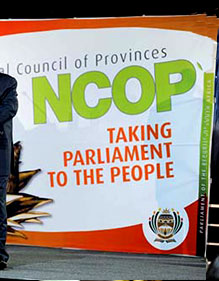
South Africa’s Parliament is the instrument whereby laws and policies of the country are proposed and their merits and legality debated on, before being passed, shelved for later discussion or discarded within a multi-party representation.
The country’s Constitution allows for members of the general public to make submissions on laws or processes of government directly to the different committees of the two houses of Parliament – the National Assembly (NA) and the National Council of Provinces (NCOP).
MPs can also make submissions should they feel that a colleague in Parliament is failing to adhere to the recently-modified Code of Conduct that governs them.
But how do citizens of a democratic country know that their voice is being heard?
One of the six key priorities of the National Development Plan Vision 2030 – the national programme established in 2010 – is the promotion of active citizenry, and this, it is hoped, will strengthen development and accountability by the public service.
Strengthening the capacity of corruption-fighting agencies and enhancing the protection of whistleblowers are two ways that government plans to achieve this goal. When Parliament encourages the public’s participation in its processes it enables citizens to help it achieve its mandate of transparency and accountability. Members of Parliament, as elected representatives of the people, are held to a high standard of integrity and accountability.
Encouraging public involvement
A provision of the Constitution is that Parliament must have power to discuss, change or even reject draft laws that come from Cabinet, which is made up of executive members who head up government departments and are appointed by the sitting president.
Members of the two houses of Parliament serve on various committees. Each department of government is answerable to portfolio committees in the NA, while there are nine committees within the NCOP that deal with provincial departments and issues.
Part of the important work of committees in Parliament is to encourage public involvement in Parliament and ensure that this is facilitated well.
The legislature has faced several instances where public engagement exercises have yielded results in its favour, and against.
When businessman Hugh Glenister, with the Helen Suzman Foundation, challenged a 2008 decision by Parliament to amend two existing laws governing the criminal justice system, he took on a major hurdle. The National Prosecuting Authority Amendment Act and the South African Police Service Amendment Act effectively made way for the dissolution of the highly effective organised crime fighting unit, the Scorpions. It had been the Scorpions that had exposed the Travelgate scandal – intricate travel voucher fraud involving MPs and several private travel agencies. Although some legal recourse was sought for the mess that damaged the credibility of Parliament, not all of the approximately R18-million lost in the debacle was recovered from the MPs involved.
Glenister’s broader battle was based fundamentally on whether MPs who have been tainted in one way or another by virtue of criminal charges, or found to have flouted Parliamentary regulations, should be allowed to continue serving in Parliament. This is because serving in Parliament effectively means that they are in positions where they deliberate and decide on laws that affect the country’s citizens.
An earlier legal battle had seen Glenister taking Parliament to court to force the institution to reveal the identities of MPs who had been found guilty of Travelgate fraud. His argument at the time was that by keeping their identities hidden, Parliament was essentially perpetuating a culture of impunity, which goes against the very standards by which it was established and is required to operate.
The battle remains in the courts.
The importance of keeping communities in the loop
In another case back in 2008, residents of Khutsong, which falls under the Merafong municipality in Gauteng, contested a move by the NCOP to approve its incorporation into the North West province following the abolition of cross-border municipalities three years earlier. The Constitution Twelfth Amendment Act of 2005 required that the provinces affected by the new demarcation processes approve the passing of the Bill by the NCOP. With the Cross-boundary Municipalities Laws Repeal and Related Matters Act 23 of 2005 coming into being, Merafong – which had historically been located in both provinces – would now have to belong to one.
The community refused to move, citing lack of adequate consultation on the part of the Gauteng government before the Bill was approved. They wanted the amendments to the two laws to be declared invalid. At a public hearing, a majority of the people in the community expressed a wish for Merafong to remain in Gauteng, but the Gauteng provincial legislature went ahead and approved the signing of the Bill into law.
The Constitutional Court ruled against the community on the point of the invalidity of the laws, but in the process highlighted the importance of public involvement by the national Parliament and provincial legislatures.

